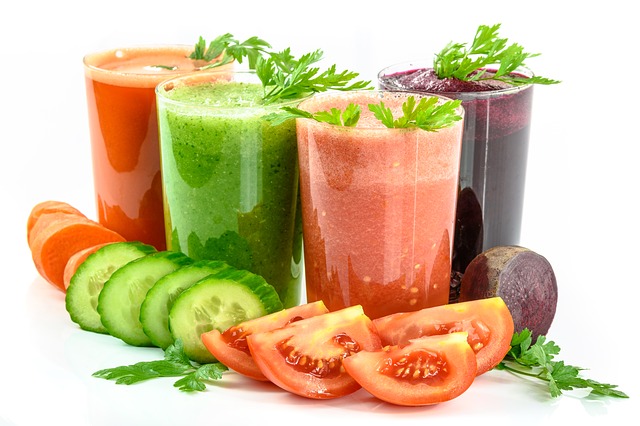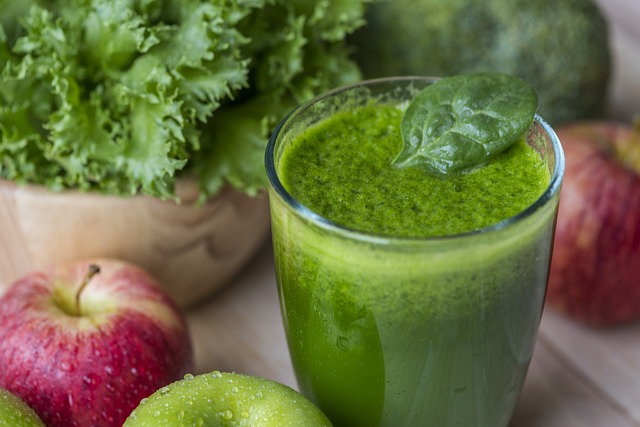 Anything that promises detoxification sounds a little questionable – like products that claim to “pull toxins out of your system” or “cleanse the liver.” The body does have detoxification mechanisms that are working all the time, and both healthful eating and intermittent fasting can accelerate those processes. Several-day juice “fasts” are one way to tap into the benefits of intermittent fasting and enhance removal of toxins from the body, because the body enhances the removal of toxins when not digesting food and burning more fat for its energy needs. Our fat supply stores toxins, and when we lose body fat we release more toxic waste simultaneously. The body also needs adequate phytochemical and antioxidants for the liver to most effectively process fat-soluble toxins so they can be excreted via the urine.
Anything that promises detoxification sounds a little questionable – like products that claim to “pull toxins out of your system” or “cleanse the liver.” The body does have detoxification mechanisms that are working all the time, and both healthful eating and intermittent fasting can accelerate those processes. Several-day juice “fasts” are one way to tap into the benefits of intermittent fasting and enhance removal of toxins from the body, because the body enhances the removal of toxins when not digesting food and burning more fat for its energy needs. Our fat supply stores toxins, and when we lose body fat we release more toxic waste simultaneously. The body also needs adequate phytochemical and antioxidants for the liver to most effectively process fat-soluble toxins so they can be excreted via the urine.
Get into the catabolic phase
We’re always either in a fed state or a fasting state; you’ve likely read about the anabolic and catabolic phases of digestion in my books or articles that discuss toxic hunger. When we are eating, digesting, and absorbing nutrients from food, we are in the anabolic phase; think of it like filling your car’s tank with gas. That is followed by the catabolic phase, between meals, in which our energy needs are met by burning energy that we stored during the anabolic phase.
The catabolic phase is when most healing and self-repair happens, and there is evidence that prolonged time in this fasting (catabolic) state has significant health benefits. Also, these benefits don’t necessarily require an extended, several-day water fast, which is difficult for most people to commit to.
I always say, the longer you live in the catabolic phase, the longer you live. Here’s why: Being in a fasting state shifts the body’s cells away from growth, and instead toward a mode of maintenance and repair.1,2 This repair mode is associated with a reduction in insulin and insulin-like growth factor-1 (IGF-1) production; two hormones that play a huge role in health and longevity.3,4 These hormonal changes lead to reduced inflammation, improved insulin sensitivity and stress resistance, slower cell growth, improved immune function, and reduced oxidative stress.5,6 Fasting also stimulates autophagy, an important self-repair process. Autophagy removes damaged components from cells and tissues.7
Eating right is already detox; calorie restriction enhances the benefits
On a cellular level, many dietary phytochemicals – such as isothiocyanates derived from cruciferous vegetables, sulfur compounds from garlic and onions, and carotenoids from a variety of colorful produce – drive the production of enzymes that enable the excretion of carcinogens and other potentially harmful compounds. This detoxification system counteracts oxidative stress, inflammation, and DNA damage.8 Eating right, in itself, enables valuable detoxification mechanisms.
Caloric restriction adds to this, and has been the one intervention that extends life in a number of different species. Adding periodic calorie restriction to an already nutrient-rich diet could intensify the body’s ability to heal and repair by extending the amount of time in the fasting repair mode and reducing growth-related signals.4 It also can enhance the breakdown and excretion of fat-soluble toxins; lowering the body’s toxic load.
Intermittent fasting
Intermittent fasting or a juice detox could also be a warm-up to incorporating occasional water fasting. Back in 1995, in my book, Fasting and Eating For Health, I discussed my experience of how fasting improved health parameters in my patients. I also co-authored a series of case reports documenting remission of autoimmune diseases following supervised fasting.9 More recently, fasting has been shown to have dramatic regenerative effects on the immune system. Studies over the past few years in animals and humans have suggested that fasting signals the immune system to discard old and damaged cells and generate new cells by increasing hematopoietic stem cells. The reduction in IGF-1 signaling was a necessary factor in this immune boosting. 6,10
Intermittent fasting – usually by reducing calorie intake dramatically a few days per week – is a method for getting some of the benefits of longer-term fasting. Human studies on intermittent fasting suggest it improves insulin sensitivity and promotes weight loss.2,11,12
I recommend incorporating a juice detox into your life, with vegetable juices plus one salad per day for several days, to act as a method of intermittent fasting, to slow aging and prolong lifespan as an easier alternative to water fasting. Water fasting has a rapidly decreasing effect at removing toxins, as nutrients necessary for the removal also decrease as the fast progresses. Also, juice fasting enables the participants to continue to work and is safer, compared to water fasting, as it prevents dehydration, loss of electrolytes and fainting. It is also compatible for people who must remain on medications, so almost anyone can participate.
Tips for juicing wisely
 Figure out a timeline you’re comfortable with. You may want to try juicing one day a week, or you may want to try a week-long juice cleanse.
Figure out a timeline you’re comfortable with. You may want to try juicing one day a week, or you may want to try a week-long juice cleanse.- Juice should be mostly vegetables, not fruit. Apple juice with a little kale added doesn’t bring much benefit. The maximum amount of fruit in a vegetable juice should be one serving of a low-sugar fruit, such as green apple or berries. The rest should be nutrient-rich vegetables, leafy greens in particular. Lemon and lime juice can be added to flavor your juice without counting toward the fruit serving. Include cucumber, lettuce and celery juice, along with carrots, beets, and some leafy cruciferous greens such as cabbage, kale or bok choy.
- Follow it up with a health-promoting diet. A few days of juicing can be a great way to reset your taste buds and jumpstart a new, healthful, nutrient-rich diet. However, there is no health benefit of trying to use a juice cleanse as temporary detox, just a break from an everyday junk food diet. This only works if you stick with a Nutritarian diet for the rest of your life, incorporating some juicing and caloric restriction episodically.
- If you have a serious medical condition or are on any medication, consult a physician before starting a juice detox.
Originally printed on DrFuhrman.com. Reprinted with permission from Dr. Fuhrman.
Dr. Fuhrman is a board-certified family physician specializing in nutritional medicine. He is President of the Nutritional Research Foundation and the author of 6 NY Times bestselling books, including The End of Heart Disease. Visit him at DrFuhrman.com.
References
- van Niekerk G, Hattingh SM, Engelbrecht AM. Enhanced Therapeutic Efficacy in Cancer Patients by Short-term Fasting: The Autophagy Connection. Front Oncol 2016, 6:242.
- Mattson MP, Longo VD, Harvie M. Impact of intermittent fasting on health and disease processes. Ageing Res Rev 2017, 39:46-58.
- Pan H, Finkel T. Key proteins and pathways that regulate lifespan. J Biol Chem 2017, 292:6452-6460.
- Solon-Biet SM, Mitchell SJ, de Cabo R, et al. Macronutrients and caloric intake in health and longevity. J Endocrinol 2015, 226:R17-28.
- Longo VD, Mattson MP. Fasting: molecular mechanisms and clinical applications. Cell Metab 2014, 19:181-192.
- Cheng CW, Adams GB, Perin L, et al. Prolonged Fasting Reduces IGF-1/PKA to Promote Hematopoietic-Stem-Cell-Based Regeneration and Reverse Immunosuppression. Cell Stem Cell 2014, 14:810-823.
- Mattson MP, Allison DB, Fontana L, et al. Meal frequency and timing in health and disease. Proc Natl Acad Sci U S A 2014, 111:16647-16653.
- Stefanson AL, Bakovic M. Dietary regulation of Keap1/Nrf2/ARE pathway: focus on plant-derived compounds and trace minerals. Nutrients 2014, 6:3777-3801.
- Fuhrman J, Sarter B, Calabro DJ. Brief case reports of medically supervised, water-only fasting associated with remission of autoimmune disease. Altern Ther Health Med 2002, 8:112, 110-111.
- Wu S. Fasting triggers stem cell regeneration of damaged, old immune system. In USC News, 2014 [http://news.usc.edu/63669/fasting-triggers-stem-cell-regeneration-of-damaged-old-immune-system/]
- Antoni R, Johnston KL, Collins AL, Robertson MD. Effects of intermittent fasting on glucose and lipid metabolism. Proc Nutr Soc 2017, 76:361-368.
- Tinsley GM, La Bounty PM. Effects of intermittent fasting on body composition and clinical health markers in humans. Nutr Rev 2015, 73:661-67
